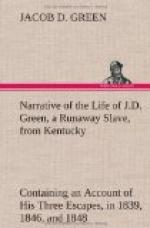owners in the County, and we were marched into the
doctor’s vestry for examination; here the doctor
made us all strip—men and women together
naked, in the presence of each other while the examination
went on. When it was concluded, thirty-eight of
us were pronounced sound, and three unsound; certificates
were made out and given to the auctioneer to that
effect. After dressing ourselves we were all
driven into the slave sty directly under the auction
block, when the jail warder came and gave to every
slave a number, my number was twenty. Here, let
me explain, for the better information of the reader,
that in the inventory of the slaves to be sold all
go by number—one, two, three, and so on;
and if a man and his family are to be sold in one lot,
then one number covers them all; but if separate,
then they have all different numbers. An old
friend of mine, belonging to William Steel, was also
with his wife and six children in the same sty, all
to be sold. The youngest was a babe in arms,
the other five were large enough to walk; his number
was twenty-one, but his wife’s number was thirty-three,
and notwithstanding the mournful idea of parting with
relations and friends on the plantation, up to this
moment they had indulged a hope of being sold as a
family, together; but the numbers revealed the awful
disappointment. Even in this hoped for consolation,
the painful distress into which this poor woman was
thrown, it is beyond my ability to describe. The
anguish of her soul, evinced by the mournful gaze
first at her children and then at her husband, made
me forget for the time being, my own sufferings and
sorrows. Her looks seemed to say to her husband—these
are your children, I am their mother—there
is no other being in this world that I have to look
to for love and protection; cant you help me?
I am very much mistaken if these were not the thoughts
running through that poor broken-hearted mother’s
mind. Reuben, for that was his name, called his
wife and children into one corner of the sty, and
repeated a verse of a hymn which may be found in Watts’
hymn book:—
“Ah, whither shall I
go,
Burthened, or
sick, or faint;
To whom shall I my troubles
show,
And pour out my
complaint.”
Not daring to sing it for fear of disturbing the sale,
they both knelt down with the children, and Reuben
offered up a long and fervent prayer. In the
interval of his prayer nineteen of the slaves were
sold, and he had not concluded when my number being
twenty was called, and my master handed me out under
the hammer; when, after a few preliminary remarks on
the part of the auctioneer, my master mounted the
auction block and recommended me as a good field hand,
a good cook, waiter, hostler, a coachman, gentle and
willing, and above all, free from the disease of running
away. So after a short and spirited bidding I
went at 1,025 dollars. Here the sale policeman,
whose business it was to take charge of the negroes




